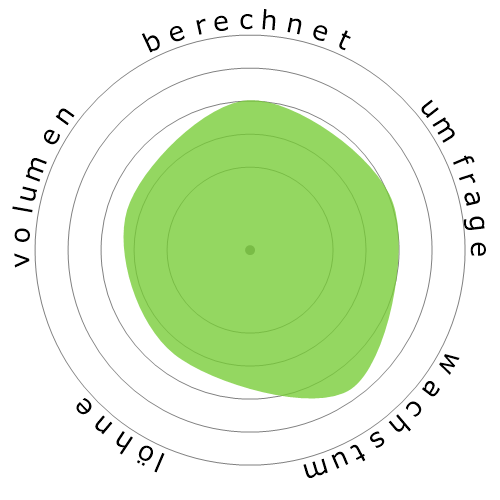Flugbegleiter
Wohin möchten Sie als Nächstes gehen?
Oder erkunden Sie diesen Beruf ausführlicher...


Was zeigt diese Schneeflocke?
Was ist das?
Wir bewerten Jobs anhand von vier Faktoren. Diese sind:
- Chance der Automatisierung
- Jobwachstum
- Löhne
- Anzahl der verfügbaren Stellen
Dies sind einige wichtige Punkte, über die man beim Jobsuchen nachdenken sollte.
Personen haben sich auch angesehen
Berechnetes Automatisierungsrisiko
Geringes Risiko (21-40%): Jobs auf dieser Ebene haben ein begrenztes Risiko der Automatisierung, da sie eine Mischung aus technischen und menschenzentrierten Fähigkeiten erfordern.
Weitere Informationen darüber, was dieser Wert ist und wie er berechnet wird, sind verfügbar hier.
Benutzerumfrage
Unsere Besucher haben abgestimmt, dass es eine geringe Chance gibt, dass dieser Beruf automatisiert wird. Diese Einschätzung wird weiterhin durch das berechnete Automatisierungsrisiko unterstützt, welches eine 38% Chance der Automatisierung schätzt.
Was denken Sie, ist das Risiko der Automatisierung?
Wie hoch ist die Wahrscheinlichkeit, dass Flugbegleiter in den nächsten 20 Jahren durch Roboter oder künstliche Intelligenz ersetzt wird?
Gefühl
Das folgende Diagramm wird angezeigt, wenn genügend Stimmen vorhanden sind, um aussagekräftige Daten zu erzeugen. Es zeigt die Ergebnisse von Nutzerumfragen im Laufe der Zeit und bietet einen klaren Hinweis auf Stimmungstrends.
Gefühlslage über die Zeit (jährlich)
Wachstum
Die Anzahl der 'Flight Attendants' Stellenangebote wird voraussichtlich um 9,9% bis 2033 steigen.
Gesamtbeschäftigung und geschätzte Stellenangebote
Aktualisierte Prognosen sind fällig 09-2025.
Löhne
Im Jahr 2023 betrug das mittlere Jahresgehalt für 'Flight Attendants' 68.370 $, oder 33 $ pro Stunde.
'Flight Attendants' wurden 42,3% höher bezahlt als der nationale Medianlohn, der bei 48.060 $ lag.
Löhne über die Zeit
Volumen
Ab dem 2023 waren 126.020 Personen als 'Flight Attendants' in den Vereinigten Staaten beschäftigt.
Dies entspricht etwa 0,08% der erwerbstätigen Bevölkerung im ganzen Land.
Anders ausgedrückt, ist etwa 1 von 1 Tausend Personen als 'Flight Attendants' beschäftigt.
Stellenbeschreibung
Überwachen Sie die Sicherheit der Flugzeugkabine. Bieten Sie Dienstleistungen für Fluggäste an, erklären Sie Sicherheitsinformationen, servieren Sie Speisen und Getränke und reagieren Sie auf Notfälle.
SOC Code: 53-2031.00
Kommentare (30)
Plus, robots can't do such things as CPR or use a first aid kit, for example. So, it's pretty risky.
I have witnessed a decline in the manners and decorum of the passengers traveling. Possibly, the added stress to passengers of airport safety procedures has taken a toll on their nerves. I remember when friends and family could accompany passengers to the gate. Now, the seats are packed in like sardines in a can.
Airline competition made the way for no-frills service and more passengers in smaller seats on airplanes. This has taken a toll on everyone's stress levels. Still, I see friendly FAs who are doing their best to accommodate everyone onboard and assuage those who are already frazzled by the time they take their seats.
A robot may make the dispersion of in-flight commodities easier but it can never take care of all of the emergencies that FAs are trained to handle, the medical emergencies, the duplicate and other seating problems, the myriad of human interactions that FA's handle, unaccompanied children, wheelchair passengers, interaction with cockpit and ground staff, etc., etc. the list goes on, not even considering a major emergency like a hijack incident.
You have vastly underestimated the uber-selective hiring, initial and ongoing training that FAs have. Did you know that they have to take FAA-mandated emergency testing yearly on every airplane which they are qualified to work and pass the test with a 90-100% grade. This includes physical testing in airplane simulators., first aide, resuscitation and cardio procedures etc.
If you see an FA behaving in the unprofessional manner you have described, you should write a letter to the airline about that employee.
Auf Kommentar antworten